
Guests
- Angela Davisworld-renowned abolitionist, author, activist and professor at the University of California, Santa Cruz.
World-renowned author, activist and professor Angela Davis talks about navigating the pandemic and an inadequate two-party political system during a time of racial uprising in the United States. She also talks about imprisoned journalist Mumia Abu-Jamal, the Biden presidential campaign and the protests that erupted from the police killing of George Floyd and Breonna Taylor.
Transcript
AMY GOODMAN: This is Democracy Now! I’m Amy Goodman, as we return to our conversation with Angela Davis, the world-renowned abolitionist, author, activist and professor. I interviewed her with Juan González.
JUAN GONZÁLEZ: Speaking of reflection, you’ve been on Democracy Now! to talk about President Obama, you’ve been on to talk about President Trump, and then the Biden campaign, as well. And you said in 2020, “I do think we have to participate in the election,” but noted that in our electoral system as it exists, neither party represents the future that we need in this country. So, here we are now one year into the Biden presidency, the battles over these various — huge stimulus program concluding now, Build Back Better. The progressives are battling over what they should do if the Build Back Better program is further eviscerated. Your counsel to radicals and progressives about how they should deal with the Biden administration?
ANGELA DAVIS: Well, you know, those of us who voted for Biden and Harris did not do so because we expected to follow them as leaders in our struggle. We could have predicted this moment now. But I think that what we have learned, especially since the mobilizations of the summer of 2020, is that history does not change because a few leaders here and there decide to take particular positions or decide to pass bills. And, of course, I am not at all trying to minimize the importance of electing progressives and radicals both to Congress and to local office. I’m not at all disparaging that. But what I am saying is that in order to make real, lasting change, we have to do the work of building movements.
It is masses of people who are responsible for historical change. It was because of the movement, the Black freedom movement, the midcentury Black freedom movement, that Black people acquired the right to vote — not because someone decided to pass a Voting Rights Act. And we know now that that victory cannot simply be consolidated as a bill passed, because there are continual efforts to suppress the power of Black voters. And we know that the only way to reverse that is by building movements, by involving masses of people in the process of historical change. And that holds true for the current administration.
AMY GOODMAN: Angela, we’re still in the midst of the pandemic, and I’m wondering how it affected you over this past year and a half. As you talk about movements, so often it’s people gathering, whether we’re talking about the Critical Resistance conferences, the mass protests in the streets after George Floyd was murdered by the police. There were mass protests in the streets even during the pandemic, of course. But if you can talk about, just personally, what this meant for you and if you feel like we’ve learned something, everything from respecting science — and that goes not only from talking about vaccines but to climate change — the issue of vaccine inequity in the world, emphasizing those who have and those who don’t have in so many ways, but then also, personally, how you got by?
ANGELA DAVIS: Well, Amy, I am actually very fortunate in that I live in California. I live in Oakland. And I have access to the kind of technology that puts me in touch with people all over the world. So there are some things that I found really exciting about this terrible pandemic that claimed the lives of so many people, particularly Black and Indigenous and people of color and poor people, more broadly. What I might say was a kind of gift that was offered us in the midst of all of this sadness and tragedy was the fact that we can communicate with people all over the world. And so I participated in conversations that never would have happened had I been compelled to travel in order to be involved in these conversations — for example, a conversation in the Amazonas in Brazil that involved Afro-descended Brazilians, Indigenous Brazilians and people who are active in the struggle against police violence. So I think that there are some ways in which we consolidated our internationalism — of course, not consolidated, but we were able to engage in the kinds of practices that allowed us to recognize how important those ties are.
You know, on the other hand, of course we all need human community. We all need the closeness and the touch of human beings. And that has been so difficult.
I would also point out that I don’t know whether we would have achieved this kind of awareness of the nature of structural racism. And I don’t know whether so many people would have gone out into the streets, at their own peril, of course, because in the summer of 2020 we were not really clear about the ways in which the virus is transmitted. But I don’t know whether so many people would have felt compelled to go out and protest, if we had not become aware as a country — and I’m talking about a good majority of the population in the country — of the realities of structural racism. And the impact of the virus taught as about the nature of structural racism, as it had an impact on the healthcare system, as it claimed — as the virus claimed the lives of disproportionate numbers of Indigenous and Black people and people in the Latinx community. And that awareness helped to condition the response to the police lynching of George Floyd.
And so, as tragic as this period has been, as difficult as it has been to live without the closeness of our community, as terrible as that has been, it has also offered us some gifts. And I don’t know whether we would have experienced a situation in which more people than ever before in the history of this country went out in the streets and marched and protested and said no to racism.
JUAN GONZÁLEZ: Angela, I wanted to ask you — you mentioned earlier on Mumia Abu-Jamal. In our early years on Democracy Now!, we were knocked off the air in a bunch of Pennsylvania stations as a result of airing his commentaries. I knew Mumia personally because we worked together as journalists in Philadelphia in the early 1980s. I’m wondering — he has continued to be in prison, turned 67 in April, is 40 years now in prison. He’s had COVID, heart surgery this year. Could you talk about his importance? He’s one of the most famous political prisoners in the world. He has continued to have amazing commentaries and writings throughout his time in prison. Mumia’s impact on the radical movement in America? And if you could talk about the pressing need to continue to demand his release?
ANGELA DAVIS: Yes. Thank you so much, Juan. I don’t think we would be where we are today without the consistent and dedicated participation of Mumia Abu-Jamal in our struggles. Well, first of all, I would say that Mumia is known all over the world. There are streets named after him in Germany and in France. He became the second person in the history of France, after Pablo Picasso, to receive an honorary citizenship in the city of Paris, and so that his importance is recognized elsewhere in the world. But because of the ways in which the police and the police benevolent order, the Fraternal Order of Police, because of the ways in which they have misrepresented Mumia and mobilized the entire police community all over the country against Mumia, he remains in prison, after having served time for more than 40 years, including much of it on death row.
What I would say now is that precisely because we have succeeded in making public critiques of the police — and, of course, we see them now trying to reconsolidate their power all over the country, but because there are these fissures in the power of the police, we should take advantage of that to intensify the campaign to free Mumia Abu-Jamal. I was just communicating the other day with Julia Wright, the daughter of Richard Wright, who has been so important in France in developing the campaign to free Mumia. And she and people all over the world want to see us bring the case of Mumia to the fore, especially now, considering the fact that David Gilbert, who has been in prison almost a half a century, was released on parole recently, two weeks ago. We have to claim that victory and recognize that this is precisely the moment to demand more releases, to demand the release of Leonard Peltier, who has been in prison even longer than Mumia, and all of the political prisoners who remain behind walls.
AMY GOODMAN: People can go to Democracy Now! and see our interviews with Leonard Peltier. I know we have to wrap up, and it’s very hard for me and Juan to stop this conversation, but — and we’re going to talk to you again on Democracy Now! Your book is coming out again, it’s being reissued, Angela Davis: An Autobiography, which astoundingly was edited by Toni Morrison. We talked to you on Democracy Now! when Toni Morrison died. We talked to you when Aretha Franklin died. We tracked you down, I can’t remember where. And it’s amazing, because while people talk about Aretha’s great artistry, what people didn’t realize is that she was involved with offering to post bail for you when you were in prison, saying, “Black people will be free.” And I’m wondering if you can reflect — we’ll go much more extensively into this when your book comes out — on these relationships you have had and what gives you hope for the next generation of artists, writers, scholars and activists, all of which you are, rolled into one.
ANGELA DAVIS: Well, you know, I think that having — I think that having lived this many decades and having experienced what I have in the context of movements against racism and against heteropatriarchy, against imperialism, I am more committed than ever to using what talents I might have to developing movements for radical change.
And you mentioned Aretha Franklin and the fact that she offered to post bail for me. That was a very moving moment in my life, and I have come to recognize how absolutely essential the role of artists has been and will be for our movements. This is a period during which musicians and visual artists, poets, writers are all using their talents collectively to create more possibilities for the kinds of conversations that will bring people into movements for justice, for freedom, for equality.
And let me say one more thing, which, unfortunately, we haven’t discussed during the course of this wide-ranging conversation, and that is the power of global capitalism. And I still see that we need — I still think that we need artists to show us the way toward a very different organization — economic, political, social organization — of our worlds, and capitalism has to fall.
AMY GOODMAN: Well, Angela Davis, we want to thank you so much for being with us. And I want to ask you, finally, about the issue of independent media, of people shaping their own narratives. I mean, I think that’s the power of the corporate media, is they tell a story, whether it is true or not, brought to you by the weapons manufacturers every five minutes or the drug industry every 10 minutes, you know, the commercials, as you talk about capitalism. If you could talk about a different kind of media in, perhaps, if you want to imagine this, a post-capitalist society and what that would offer, since it’s the way people can communicate with each other all over the world?
ANGELA DAVIS: Well, I think it’s so important now, Amy, to imagine new worlds. We cannot fight for those worlds unless we know how to imagine them. And independent, progressive media, like Democracy Now!, help to inspire us in that project of collective imagination to allow people to tell their own stories. And, of course, you go where the movements are unfolding. I’ll never forget watching your arrest at Standing Rock and how that campaign helped to galvanize a more holistic understanding of what it is we’re struggling for, the freedom that we’re fighting for, that we have to save this planet. And Indigenous people, the stewards of this land for so many millennia, have taught us that the struggle for the environment has to be central to our work. And you present their stories. So I thank you and Juan and all of your colleagues for the work that you continue to do. And I’m sure we’ll be speaking to each other in the near future.
AMY GOODMAN: World-renowned abolitionist, author, activist and professor Angela Davis.

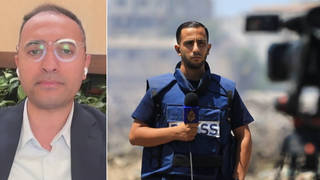
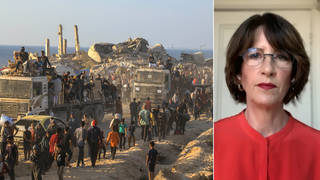
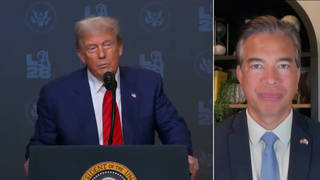
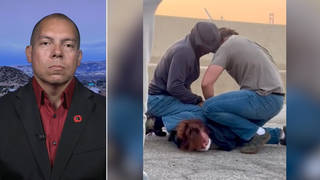






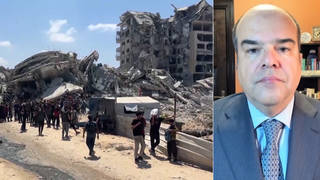
Media Options